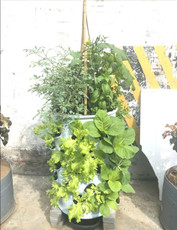 Loading... Please wait...
Loading... Please wait...
WE DELIVER! 6328140854
Pages
- Home
-
Consult/GetAdvice
- Workshops
-
Grow your Own Food
- About Us
-
Blog
-
Learn
- Why you should be eating Slow Growing, Heritage Breed, Pasture-raised Chickens
- The Philippine Cattle Industry: An Introduction
- Biodynamic Food: Healthier & Tastier
- Grass Fed Beef v. Imported v. Grain
- Understanding Meat Terms: Grass Fed, Pastured and Organic
- Pasture-raised v. Free-range Chickens
- Questions to ask to ensure you're buying Grass Fed Beef
- Storing and Handling Beef
- Cooking Grass Fed Beef to Perfection
- Cooking Grass Fed Steak
- Grass Fed Beef: More Health Benefits
- Grass Fed Beef: Lower in Fat, Calories, High in Omega-3s
- Grass Fed Beef: Healthier Meat than Chicken
- FAQ
-
Contact
Vertical Tower Garden: Our BESTSELLER
- Home
- Urban Gardening
- Vertical Tower Garden: Our BESTSELLER
- Home
- Vertical Tower Garden
- Vertical Tower Garden: Our BESTSELLER
Vertical Tower Garden: Our BESTSELLER
Product Description
A biodegradable waste solution for small spaces or urban environments with little or no access to a garden or land. The project utilizes food waste from households, restaurants, or communities; and any biodegradable waste such as brown paper and newspapers and converts waste into compost and food for worms. The small scale, vertical food garden and composter, is a closed-loop system. Biodegradable trash is fed into the bin, to be decomposed by worms. The worm castings then produce nutrient rich soil in containers. Subsequently, this dense soil is the same medium to grow leafy vegetables and fruit bearing plants. The project has been initiated and developed in some private homes and small residential compounds, and has successfully managed waste, transformed waste as a fodder for worms, and produced nutrient-dense soil that then acts as a medium for food plants.
The system is an inexpensive alternative to expensive systems, such as hydroponics or even vertical walls.
Includes:
- Vertical Food Garden with Built in Composter
- Worm Bin and Waste Converter using local worms
- Water Collection Basin
- Compost Bin and Compost Activator
- Endemic plants and seedlings
Purpose and Uses
- Allows self-contained food gardening in small spaces, especially urban communities with little or no access to land or garden space
- Allows vermicomposting to assure worms and vermicast for compost, even absent a compost pit. Worms eat the kitchen waste as it decays. Vermicompost system is easier than conventional systems as the worms are protected from dryness, heat or excess moisture.
- Allows individuals, homes, or communities access to nutritious and organic food, locally grown in their own homes and spaces
- Especially beneficial for food insecure households. Allows for the abundant growth of up to 25-30 plants grown vertically in very little space.
- A climate change resiliency strategy, as it assures households of access to food in times of disasters or emergency
- The vertical garden is pre-built, simple to set up, replicable and also climate-resilient.
- The natural ecosystem makes it easy to maintain, eliminating weeding, needing little water, no electricity, while preventing nutrient or water loss, which is usually lost as runoff. In normal garden systems, or vertical gardens, the soil easily gets depleted and you have to use fertilizer or replace the soil. This system eliminates that problem, as the worms keep the soil in good condition.
- A biodegradable waste or food waste solution, as food scraps and paper waste is converted to compost, on site. Kitchen scraps are fed directly to the vertical garden. There will be no need to throw food waste as garbage. Communities or households will not need large spaces for composting.


